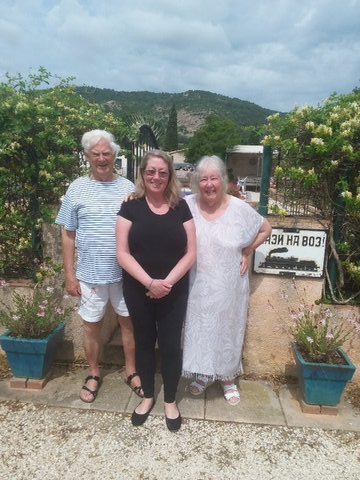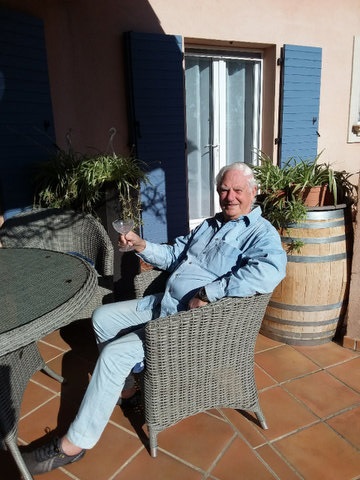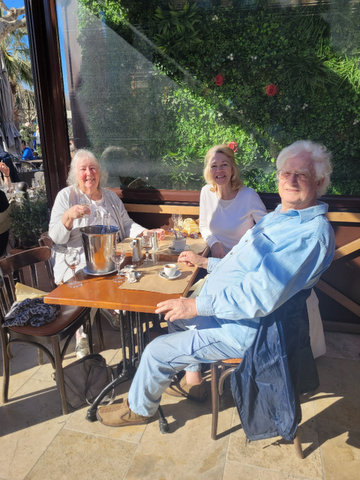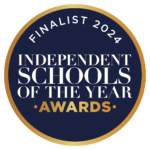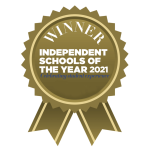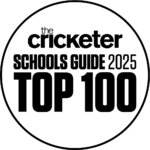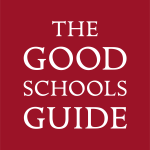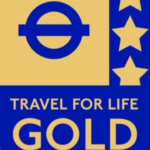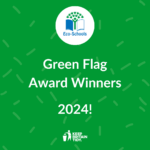Alan Sewards (OE1943-50) joined Emanuel 80 years ago. He is a member of a group of OEs who have kept in touch since schooldays and until quite recently met up every year. Now a great grandfather, Alan lives in the south of France with his wife, Beryl. Alan recently shared his memories of Emanuel and the successful career that followed with us.
What are your best memories of Emanuel?
I think the best answer to this is the friends I made. There were lots of high points, with the Corps for example, where I learned to shoot, and went on the do some competitive shooting in London as well as becoming the shooting team captain. We also got the opportunity to do both flying and gliding at the RAF Stations we visited. I did the lighting for school drama productions for several years which was a wonderful experience.
Did any particular teachers at Emanuel influence you in life or your career path?
Without doubt, the teachers who influenced me the most were the Chemistry teacher, Hirst, and the Physics teacher, Hanks. They were excellent at exposing their subject and within a couple of years, I had decided that Science was to be my future and Engineering the topic. One of Hirst’s tricks was to give a pupil a bottle containing a powder (usually white) with instructions to come back and tell him what compound it was. As a start you went down to the end wall of the lab which was covered from floor to ceiling with shelves of labelled bottles of just about every chemical compound you might come across and compare the appearance of the contents of the bottle you had been given with those on the wall. If that was not sufficient, you had to resort to tests, appearance and chemical. Hanks won my loyalty by lending me the school barograph over the summer holidays so that I could follow weather systems. I repaid him later by bringing to school a TV set that I had built from scratch using surplus air force equipment bought in Lisle Street and explaining to the class how it worked. (TV transmissions had just started in the UK at the time.)
What is the biggest lesson Emanuel taught you?
I was proud to have finished the school with 4 good A-levels (Physics, Chemistry, Maths and General). I think the biggest lesson I learned was how to get on with people and to win them over if needed. I was an avid reader and could write English well and I was an ace at spelling, so in later life I was often asked to write letters or papers when something special was involved.
Have you stayed in touch with Emanuel friends?
I quite quickly made friends with three of my fellow class students who lived within a mile of me and had several common interests which included trains (railway and model) and radio and electronics and we would spend a lot of our spare time together. This friendship has lasted to the present day, being kept alive by emails and occasional visits. We try and meet for dinner once every year but Covid put a stop to that, so the last time was in in Paris 4 years ago.
Ken Round and I developed an interest in locks and through reading and visits to museums, became quite knowledgeable. At school, we were often in demand to open cupboards for which the key had been lost or rooms that could not be entered. In fact, at the end, I had a set of home-made master keys for the whole school!
Can you tell us about your education and career after leaving Emanuel?
From Emanuel, I went straight to University College London to study for an Electrical Engineering degree. I thoroughly enjoyed this experience; the laboratories were marvellous and the staff absolutely first class, and I emerged with a B.Sc (Eng) First Class Honours and was one of two who headed the list of graduates.
It was suggested to me by one of the professors that I should consider entering a study programme for a Ph.D and he had a topic and a grant standing by. It sounded interesting and I greatly respected the professor so I accepted. It was an interesting but difficult topic – the development of an oscilloscope tube that would work up to microwave frequencies. The first thing I had to do was to learn about vacuum technology as this would be key to building the demonstrator model. The research work went well enough for two years until my supervisor and prof accepted the offer of a full Professorship at Sheffield University. Unfortunately, there being nobody else on staff with a knowledge of the subject, the supervisorship was taken over by the Professor of the Department who had no knowledge of the work and didn’t ask me for a briefing before writing me a letter saying that he did not think was the work that had been done was sufficiently new to qualify for a Ph.D. I had previously received an attractive offer to go to the Royal Aircraft Establishment, Radio Department, to work on Electronic Warfare, so I resigned from the UCL position and went directly to Farnborough without writing my thesis.
I stayed at RAE Farnborough and had a most satisfactory time, with lots of flying in our airborne laboratory until in 1970 I decided that there was no future in my specialities in the UK and I emigrated to Canada with my family, joining the Defence Research Establishment Ottawa as a Defence Scientist. I remained there, becoming Director of the Electronic Warfare Division after a few years. In 1990 I did an industrial exchange with MEL Defence Systems, becoming the Chief Scientist. MEL Defence Systems was absorbed by Lockheed Martin and I retired from government service in 1992 to become Chief Scientist at Lockheed Martin Canada, until my final retirement in 1996.
What opportunities do you feel Emanuel gave you?
Emanuel gave me the opportunity to find out my preference for my life’s work and to follow it through. The school also taught me how to study and gave me the confidence to take an important decision like emigrating when I felt it was opportune.
What do you enjoy doing in your spare time?
As a homeowner, there is always a lot to do to maintain and improve the property. This is particularly true here in France as labour is a problem. I am pretty good at this sort of work and quick to learn new tricks, so do most of it myself, including managing an outdoor swimming pool. Ongoing hobbies include computers, reception of weather satellite data and imagery, and how the weather machine works and how to predict the future weather.
